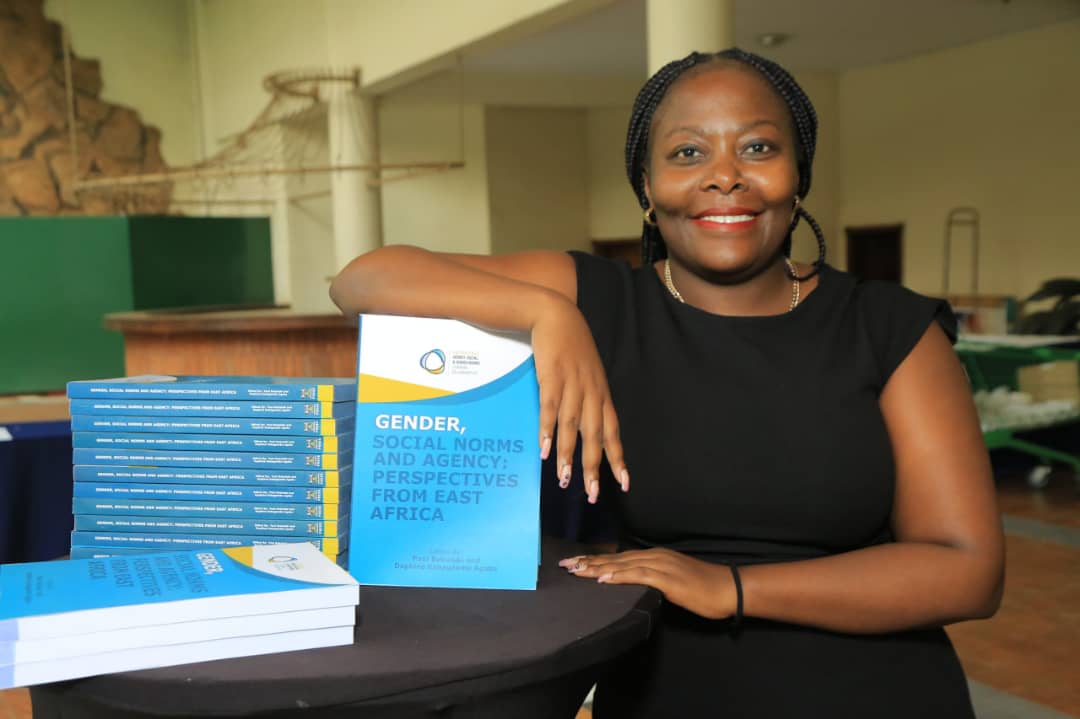Makerere University releases book on why gender, social norms are key change drivers
Social norms are deeply embedded in cultural traditions, community practices, and historical contexts, playing an essential role in sustaining social cohesion, collective identity and societal order.
Makerere University staff, development partners and publishers in a group photo during the book launch at Golf Course Hotel on Wednesday evening. (Courtesy)
________________
Women, men, boys and girls around the world are shaped by the expectations of those around them-often referred to as social norms, Dr Rebecka Lundgren says.
Lundgren, a co-executive director of the Centre on Gender Equity and Health at the University of California, San Diego, adds that few factors influence health and well-being across the life course as profoundly as socially constructed gender norms, which define what is deemed acceptable within a given society.
"While gender norms can foster equitable relationships and healthy development, they often reinforce power imbalances between men and women. Effective social and behaviour change efforts must address the central role of social norms in empowerment- the process of building critical consciousness, setting self-determined goals, and exercising agency. At its core, empowerment is about agency, the ability to make choices and act on them".
Lundgren's remarks are part of the foreword in Makerere University's latest analysis of gender, social norms and agency in East Africa.
The Gender, Social Norms and Agency: Perspectives from East Africa book aims to bridge the gap between research and practice in addressing social norms that affect gender equality in the region.
The book says the creation of lasting change in the empowerment process has failed most times because social norms have been neglected or overlooked. The authors show how social expectations are learned, enforced and contested. Social norms are shared beliefs about what is often considered to be acceptable or expected behaviour in a specified reference group, according to the Social Norms Atlas.
Social norms are deeply embedded in cultural traditions, community practices, and historical contexts, playing an essential role in sustaining social cohesion, collective identity and societal order.
According to Makerere University's Institute of Gender and Development Studies lecturer, Dr Daphine Kabagambe Agaba, one of the book’s editors, the Makerere University Press publication responds to a recurrent challenge in gender programming: the slow pace of behavioural change.
Dr Daphine Kabagambe Agaba, a Makerere University lecturer and one of the co-editors of the book titled Gender, Social Norms and Agency: Perspectives from East Africa, displays the book at Golf Course Hotel on Wednesday evening. (Courtesy)
“We have done gender work for many years, but the behaviour change we expect often takes five or even 10 years,” she told New Vision Online at the launch held on November 18, 2025, evening at Golf Course Hotel in Kampala city.
“So, we asked ourselves: What are the attitudes, beliefs and group behaviour that continue to influence these outcomes? That is how the idea of integrating social norms came in".
The book includes contributions from academics and practitioners across Uganda, Kenya and Tanzania, offering grounded perspectives on how cultural expectations influence actions, resistance and change within communities.
Illegal practices persisting
Agaba cited examples such as child marriage, female genital mutilation (FGM) and the continued demand for bride price as practices that persist despite laws prohibiting them.
“There are positive social norms like community support during weddings or funerals, but there are also negative norms that persist even where laws exist. Understanding both helps us frame interventions better,” Agaba added.
The publication comprises 13 chapters, 11 authored pieces, six from Makerere University lecturers and five from field practitioners working directly with communities. The contributing authors are Agaba, Prof. Paul Bakuluki, Hilda Ngaja, Davis Ochieng' Okeyo, Prof. Tabitha Mulyampiti, Aloysious Nnyombi, Dr Peter Nareeba, Kato Francis, Dr David Mugambe Mpiima, Dr Julius Mugisa, Kirabo Suubi, Dr Victoria Flavia Namuggala, Monica Nabukalu, Sally Nagawa Geraldine, Dr Richard Asaba Bagonza, Rita Larok, Dr John Bosco Asiimwe, John Paul Nyeko, Lydia Murungi and Abubaker Ally Rehani.
Agaba said the book’s strength lies in its combination of theory and real-world implementation.
“This is not just academia writing. These are people doing the real work on the ground,” she said. “We are pushing forward action-oriented research that can directly inform and improve project implementation.”
The book’s development took one-and-a-half years, beginning with a call for abstracts in October 2024, which attracted 30 submissions. Fifteen were selected and developed into full chapters of up to 40 pages each, followed by a rigorous peer review and quality assurance process in partnership with Makerere University Press.
The final publication, priced at shillings 30,000, targets policymakers, non-governmental organisations, researchers and students.
Africa-led knowledge generation
According to Agaba, the publication marks a shift toward Africa-led knowledge generation.
“Research on gender has long been dominated by voices from the Global North,” she said.
“With this book, we are intentionally documenting our own experiences and knowledge from East Africa—because solutions must come from those closest to the context.”
Social norms are a major barrier
Several sector leaders attended the event, including Dr Aramanzan Madanda, CARE Uganda’s country representative and Deogratias Yiga, the executive director of Impact and Innovations Development Centre (IIDC).
Yiga told New Vision Online that social norms remain a major barrier in humanitarian and development programming.
“In most of the work we do, especially addressing poverty, injustice, gender inequality, abuse and violence against women and children, one of the key factors that perpetuates these problems is deeply rooted social and gender norms,” he said.
The book is the flagship publication of the Eastern Africa Agency, Social and Gender Norms Learning Collaborative (EALC), established in 2021.
The Collaborative brings together researchers, practitioners, policymakers and community representatives from the region to strengthen evidence generation and programming capacity.
Some of the launch highlights included the official unveiling by Makerere University Press, presentations from EALC leadership and development partners, and a panel discussion featuring lead contributors.
A variety of scholars, policymakers and practitioners also shared reflections on the significance of locally produced gender research.